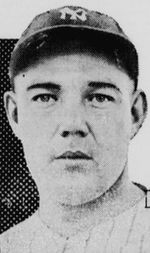| George Pipgras | |
|---|---|
 | |
| Pitcher | |
| Born: December 20, 1899 Ida Grove, Iowa, U.S. | |
| Died: October 19, 1986 (aged 86) Gainesville, Florida, U.S. | |
Batted: Right Threw: Right | |
| MLB debut | |
| June 9, 1923, for the New York Yankees | |
| Last MLB appearance | |
| June 2, 1935, for the Boston Red Sox | |
| MLB statistics | |
| Win–loss record | 102–73 |
| Earned run average | 4.09 |
| Strikeouts | 714 |
| Stats at Baseball Reference | |
| Teams | |
| Career highlights and awards | |
| |
George William Pipgras (December 20, 1899 – October 19, 1986) was an American right-handed starting pitcher and umpire in Major League Baseball.
Known as "The Danish Viking", he spent most of his playing career with the New York Yankees, breaking in as a rookie in 1923. He spent the 1925 and 1926 seasons in the minor leagues, and became a starter in the rotation for the first time with the legendary 1927 team. Pipgras lead the American League in wins with a 24–13, 3.38 ERA record for the following year's 1928 repeat champions.
After ending his 11-year career with the Boston Red Sox, he became an AL umpire from 1938 to 1946, and was the umpire behind the plate in one of baseball's most dramatic wins ever: on September 30, 1945, at Sportsman's Park in St. Louis, when Hank Greenberg hit a ninth-inning grand slam, after Pipgras suggested to Greenberg the game should be called on account of darkness. However, Greenberg convinced him he could still see the ball, so the game proceeded. The next pitch was hit over the fence and the Detroit Tigers went on to win the pennant and eventually the 1945 World Series over the Chicago Cubs 4–3 in 7 games.
His younger brother Ed pitched briefly for the 1932 Brooklyn Dodgers.